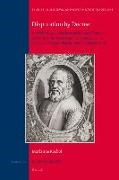Ulteriori informazioni
Summary: Prevailing scholarly analysis of the public disputations between D.V. Coornhert (1522-1590) and Dutch Reformed ministers is firmly rooted in a principled view of early modern tolerance. This study proposes a new point of departure, which involves breaking away from a Coornhert-centred reading of the debates in Leiden and the Hague, while focusing on the formal status of these disputations instead. Government support of the Reformed Church proved the backbone of these illuminating 'disputations by decree'. The public legitimization of the Reformed Church - a goal with both political and theological significance - was at stake. As a micro-history of two very unique occasions in Dutch history, this study sheds new light on the complex development of political and religious argument in the early phase of the Dutch Revolt.
Sommario
Acknowledgements; Abbreviations; Disputation by decree. An introduction; 1. Wartime polemics. On the public church; Letters and pamphlets; Troubled times; A public church; Scepticism; 2. Room for debate. A question of tolerance? The cult of Coornhert; The problem of liberty; Reformation and disputation; 3. The Coornhert affair (I). From correspondence to disputation; Thomas Tilius; Pestilens ille homo; Paper controversy; Debate in Delft; Leiden academy and beyond; 4. Pro et contra. The Leiden disputation (1578); Along the Rapenburg; Fury; Disorder; Settling accounts; Exit; 5. The Coornhert affair (II). From pamphlet to disputation; Adrianus Saravia; Narrow margins; Proeve; Resolution, remonstrance and request; Lobbying a reluctant States; 6. Bridging the divide. The disputation in the Hague (1583); The Binnenhof; Conditions; Pertinentia; Multiplication; Persuasiveness; An open ending; In conclusion. Authority and order; Bibliography; Index
Info autore
Marianne Roobol, Ph.D. (2005) in History, University of Amsterdam, studied History at the University of Leiden.

